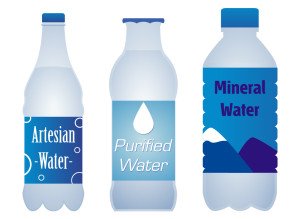Bottled Water: A Billion Dollar Business
 Have you ever wondered about the different types of water? How is artesian water different from mineral water? Do those distinctions actually matter?Here’s a guide to everything you need to know about water!Tap Water vs. Bottled WaterOne of the primary differences in taste between tap and bottled water is how the water is disinfected. Tap water is typically disinfected with chlorine or chloramines, while bottled water is typically disinfected with ozone or ultraviolet light. The latter processes do not leave behind any unpleasant aftertaste.Types of Bottled WaterThe FDA monitors a variety of different water categories, including…
Have you ever wondered about the different types of water? How is artesian water different from mineral water? Do those distinctions actually matter?Here’s a guide to everything you need to know about water!Tap Water vs. Bottled WaterOne of the primary differences in taste between tap and bottled water is how the water is disinfected. Tap water is typically disinfected with chlorine or chloramines, while bottled water is typically disinfected with ozone or ultraviolet light. The latter processes do not leave behind any unpleasant aftertaste.Types of Bottled WaterThe FDA monitors a variety of different water categories, including…
- Bottled water
- Drinking water
- Artesian water: This is water from an underground aquifer.
- Mineral water: This is ground water that naturally contains 250ppm or more of total dissolved solids.
- Sparkling bottled water: This is water that, after treatment and possible replacement of carbon dioxide, contains the same amount of carbon dioxide that it had when originally drawn from the source.
- Spring water: This is water collected as it flowed to the surface or through a borehole.
- Purified water: This water is essentially free of all chemicals and cannot contain more than 10ppm of total dissolved solids. There are several types of purified water, including…
- Distilled: For distilled water, steam from boiling water is re-condensed and bottled, which kills microbes and removes the water’s minerals.
- Demineralized or deionized: This water is subject to a chemical process that removes most minerals, but doesn’t remove all microbes/bacteria.
- Reverse osmosis: Here, water is forced under pressure to pass through a membrane that removes all microbes, minerals, color, and chemicals.
There is no guideline for drinking a set amount of water for overall good health. The Dietary Guidelines for Americans note that a combination of drinking when thirsty and drinking a beverage with meals is sufficient to maintain hydration. However, individual needs vary considerably.By Lynn Grieger, RDN, CDE, CPT, CWC
